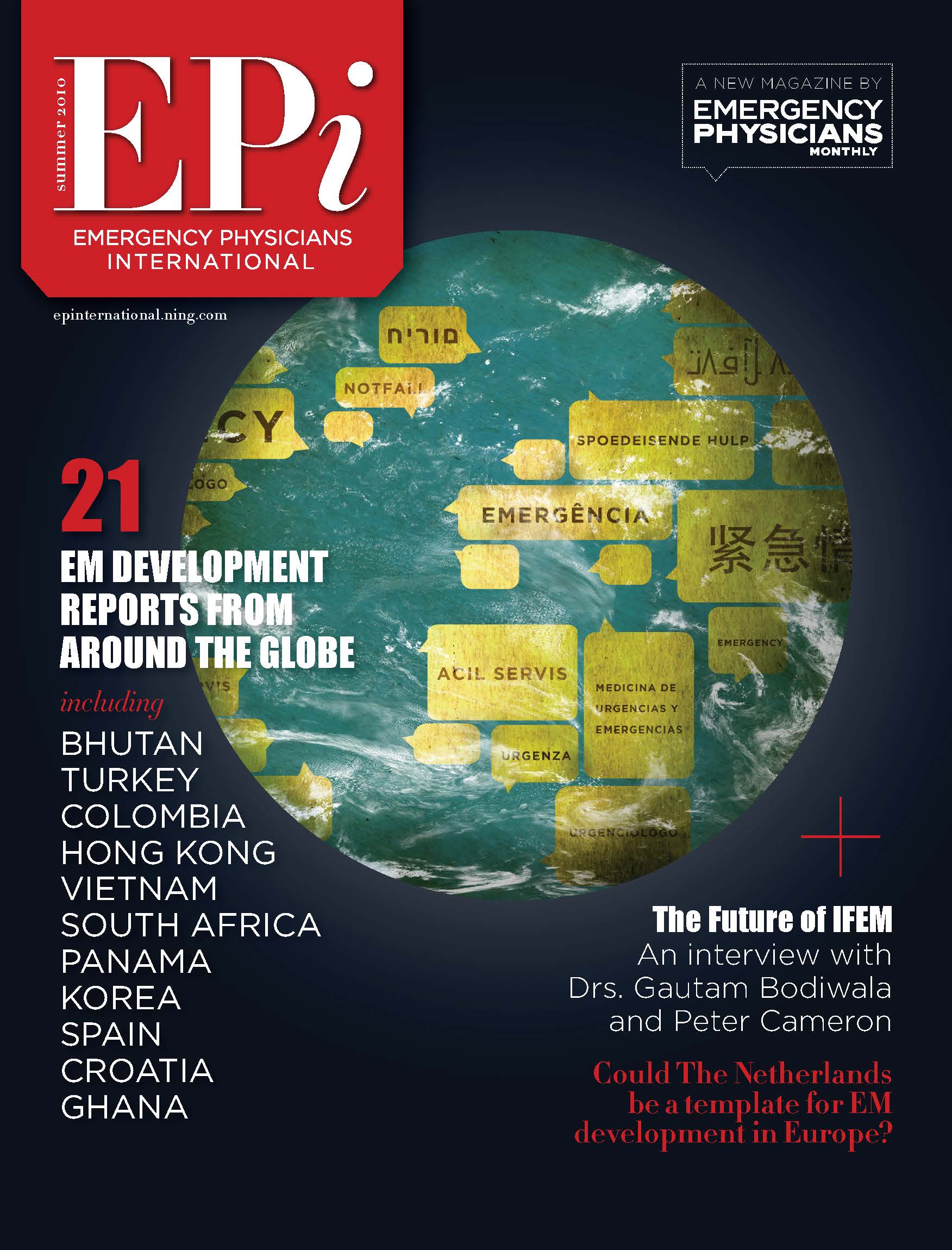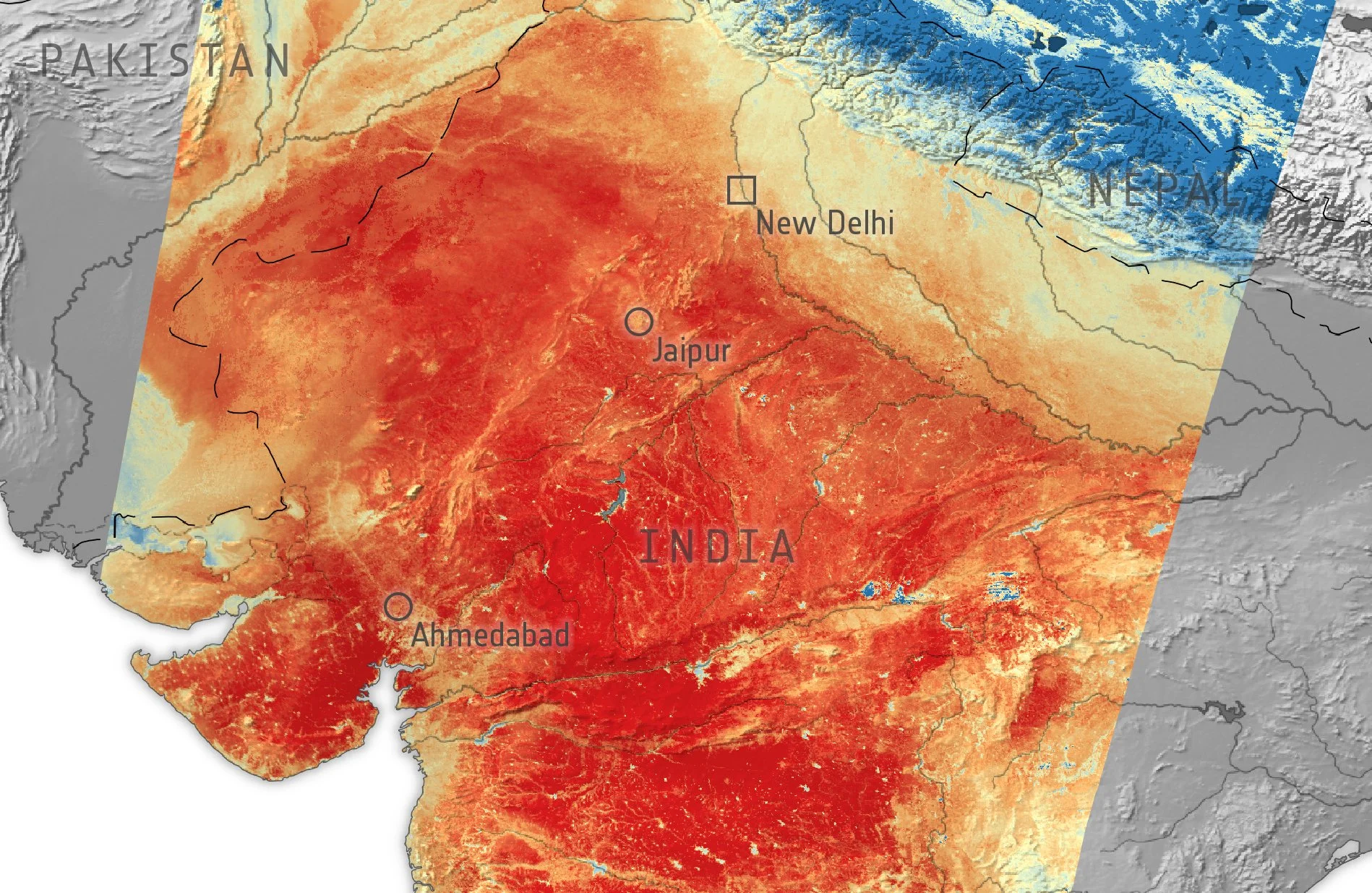Dr. Ffion Davies Shares Her Vision for Global Emergency Medicine
Dr. Ffion Davies spends the majority of her time working as a consultant emergency physician at the University Hospitals of Leicester in the UK. She’s a member of the Royal College of Emergency Medicine in the United Kingdom and is dual trained in adult and pediatric emergency medicine. But this year Dr. Davies added another job title to the mix: president of the International Federation for Emergency Medicine (IFEM). We caught up with Dr. Davies to learn about what it’s like working at the busiest ED in Western Europe (seeing around 800 patients a day) and what she’d like to accomplish as leader of IFEM.
EPI: What are some of the unique challenges of working at the busiest emergency department in Western Europe?
Dr. Ffion Davies: It's very much logistics. It needs to be a lean mean machine, like Heathrow Airport. You need to know what's coming, what's going, what's in the middle, and manage it literally every 30 seconds on the screen. So there's a command and control structure which is necessary that not every emergency department would need. You might have five attendings working side by side, but we're in different areas, it's so geographically spread out. We have one person overseeing all processes, but there's times we might have 30 doctors on one shift. There are doctors you’ve never worked with before. You don't even know their names. So that all brings challenges.
On the other hand it builds resilience. So even when really bad stuff hits, you've always got more team members you can call on. We had a crazy shift on Sunday, with six severe cases arriving in 30 minutes, but we dealt with it because we scaled up. But there's times when you feel like you are a small fish in a very big pond. But I don’t have an ego, so that’s fine.
EPI: Do you feel like that large ED model is a net positive, and ultimately is good for resource allocation?
Dr. Davies: Yes, I think so. And it makes us give a lot of attention to our processes, because on that scale of patients, anything that costs you 30 seconds you have to really evaluate whether it's worth it. So the sort of Toyota lean methodology and some of the processes we have we are very proud of because they really are slick.
EPI: What’s an example of one of these processes that we can learn from?
Dr. Davies: We are doing a lot within the first 15 minutes the patient’s arrival. So we'll have a senior doctor or senior nurse review, because we have advanced nurse practitioners. And the patient will be cannulated, blood, ECG – within 20 minutes this patient is fully packaged. So we hit them early if we can so that you're not discovering three hours down the line that you need a troponin or whatever.
Then there are the automated processes. Within our software system, if you want a nurse to do a task, like an ECG, you'll actually just put it as a task, she's got a pager-like thing, and it just lights up and just gets done. Bed requests: we don't speak to the specialists much. Seventy percent of our bed requests are straightforward to us and we don't actually need any advice. We just put the patient on the bed list for the ward. There's no permission required. A lot of things we do where no permissions are required. We just do what we need to do.
Specialty referral is not meant to result in ping-pong. It still does, but it's a one way ticket. And if somebody says, “This isn't me, this is my other specialist colleague,” you say, “Well you speak to them. We're not speaking to them.”
There are a few rules that we've invented, one called the watershed policy. There are conditions where in some hospitals this specialty takes it and in another hospital another specialty does. Like rib fractures, some may argue it’s geriatrics, or thoracic, or respiratory. We actually have a policy that says, in this situation, it goes to this specialty, and in that situation, it goes to that specialty. There is no argument and you don't have that ping-pong that takes hours to resolve. Whenever I've talked about that with other emergency physicians, they love it.
EPI: What were you hoping to accomplish by entering IFEM at the administrative level?
Dr. Davies: I've always had an interest in global travel, global medicine and equity, in the cultural differences between nations and the way they think and behave. That interests me. So it wasn't difficult to get motivated for IFEM.
I won't say that being a president was ever an ambition of mine. Because I'm not that ambitious. But actually, as I went up through the organization, I could see how much value it could have.
I think that what's interesting but tricky about IFEM is having to operate at so many levels. At one level, we're global, and we should be a global influencer. We should be subject matter experts for anybody who needs to understand what emergency medicine means. But we are also a federation of nation members. So it's the national societies who are our actual members, over 70 of them. So our first responsibility is to make sure that we're helping those nations achieve what they need to achieve. So that might be specialty advocacy. For example we’ve sent official letters to Spain and Nepal, and we’re about to send one to The Netherlands, explaining to their administrators and their governments why emergency medicine matters.
So operating at the national level is what we're supposed to do. But we also operate at regional levels. So the regional societies. We have that national imperative, but we're operating upstream at the regional level and we're operating downstream to help the emergency physician on the ground. And that's where it gets interesting, because why would an emergency physician on the ground in one part of the world need IFEM? The answer is it depends a little bit on the state of emergency medicine development in that country. I'm fully aware that in the US, Canada, UK, there may be a number of emergency physicians who have never heard of IFEM because they have such a good national body. They kind of don't need IFEM. But that's not true of many. Many nations do not have emergency medicine as you and I would know it. So there’s a lot to do at so many different levels. And that's the challenge. But that's exciting to me as well.
EPI: Do you feel like IFEM, as it's currently structured, is set up for those challenges? Or would you like to see IFEM expand and grow certain capacities?
Dr. Davies: I think if you look purely at a 2D organizational chart, it's fine. We have all the right structures to do the things we should be doing. If you look at the mission, you look at the vision, it's fine. You look at what we've generated so far for output documents. Again, it does the right job. If I was to rewrite history, I wouldn't write it any differently.
What I don't think we've maximized is outreach and influence. We have some extremely good documents that people are not aware of. We have some extremely good experts within IFEM that people are not connected to. I think one of the good things that has come out of the pandemic is our digital interaction. It only takes seconds to set of a video call and we can bring together problem solvers from around the world. We all have crowding, we all have ambulance waits, so what can we share? I think that that's where I would like to see us develop in the next two years, becoming more of a problem-solving hub and connecting people with similar problems. We can connect the regional societies together so they can learn from each other. We can connect the emergency physician on the ground through online events.
We've had our very successful “Around the World” series. We've done women in emergency medicine, cardiac arrest, toxicology. In those events, people tune in from all over and can see what happens in other people's regions. So I see IFEM as a connecting body. Now that we've done the groundwork of documents and guidelines and stuff like that we're now here to make people's lives better.
EPI: Are there particular IFEM projects that you wish more people knew about?
Dr. Davies: Where a nation has not got accreditation for a type of a course, we can help them accredit courses. We can perhaps help them fix problems with the early stages of training, give some leadership workshops, those sorts of things. We can offer a helping hand at whatever scale.
EPI: Are there any success stories, like young societies that have come into IFEM recently, that you can share?
Dr. Davies: Yes, particularly in Africa and the Middle East. The landscape has changed dramatically in the last 10 years, from emergency departments staffed by whoever you could grab – the old model – to fully fledged emergency medicine residency trainees. Now in many of these places, even the most senior consultant has been trained in emergency medicine.
EPI: What do you think is going to be the most challenging piece of leading IFM going forward?
Dr. Davies: We've got a big amount of physician fatigue. None of us has emerged out of this pandemic yet. And everybody who works for IFEM is a volunteer. So we need their time to help projects but we're all beleaguered. You know, that includes me. Our batteries are flat. And so one of the ways to regenerate your batteries is to work in this collaborative way. But there are emergency physicians out there just struggling to keep their head above water. The challenge is delivering the dream when the people who work for IFEM are all emergency physicians and we're all drained. And I'm hearing even more of that from young physicians as they come in. The reality of their career in emergency medicine isn't matching up with what they dreamed it would be, and they're not sure if they can sustain it.
EPI: Do you have any thoughts or wisdom for a young emergency physician who's not sure if their career is sustainable?
Dr. Davies: We don't want to reinvent all the wellbeing resources, because there is a lot of stuff out there on how to look after yourself, how to protect yourself. But at the end of the day, people are at the mercy of their own administration. In the UK, we're pretty fortunate that if you ask your employer, as a resident, if you can train part time, they let you. And in fact, it's crazy – in the last three years, most of our residents are working part time as a sustainability tool. But you can't do that in most other countries. So it is difficult because your own hospital administrators dictate a large part of what your working life is like.
It is very hard to encourage those younger doctors, other than for them to see good role models in the senior doctors and try and stay inspired in some shape or form, perhaps developing a subspecialty interest when they're an attending. I've done that all my career. I developed an interest in pediatric emergency medicine and spearheaded efforts in the UK. And then I turned more and more to education, simulation-based training and free online access medical education. And now I've gone more into the political side of things. And it does keep you fresh, and it keeps you energized outside of the day job.
I would encourage all emergency physicians to find one element of emergency care practice that they're passionate about.
EPI: Which is an interesting piece of advice. I think you're completely correct. But it can sound counterintuitive, because you're asking someone to add something else to their life. And the idea that being on a committee could actually give you a refresh and give you a new appreciation for your day job. That can be counterintuitive. Maybe a young doctor thinks the only answer is to cut back and do less. But sometimes that trip to a conference, even though it's more work, is actually the thing that's going to help you at your day job.
Dr. Davies: I think it is counterintuitive. But all you can say is, “Well, in all of my experience, I've been qualified 32 years now, I see that it happens, it does work.” You go and do something that you can actually call your own and have some control over and that will energize you for the other 90% or 80% or 70% of what you do.
Which is why it's a bit depressing to see that our own residents in the UK are clamoring to work part time and it's the pulling back instead of making something of it.
EPI: Any any final words of wisdom about IFEM’s role and what you want to accomplish next?
Dr. Davies: I think it has to be specialty advocacy. So many people around the world don't know what emergency physicians are, what we do, or what our scope of practice is. And sometimes we don't know that either. We're too busy trying to be everything to everyone. And everybody sees us as the default for whatever it is that they can't do. So, we have a bit of a job to do to define what we're here for and what makes a difference. The only way we're going to get out of this pandemic and the crowding and all the issues is by translating that into something that politicians will understand. And that administrators of hospitals will understand. What do you get if you employ an emergency physician? What happens to patient care? How does it actually make anything any better? Unless we explain our value, we're not going to get anybody to fix the problems of ambulance offloading, or exit block and all the other things that we're facing at the moment. That's the challenge for IFEM: how do you explain who you are, what you do, and make it relevant to the politicians and the people who hold the money.






